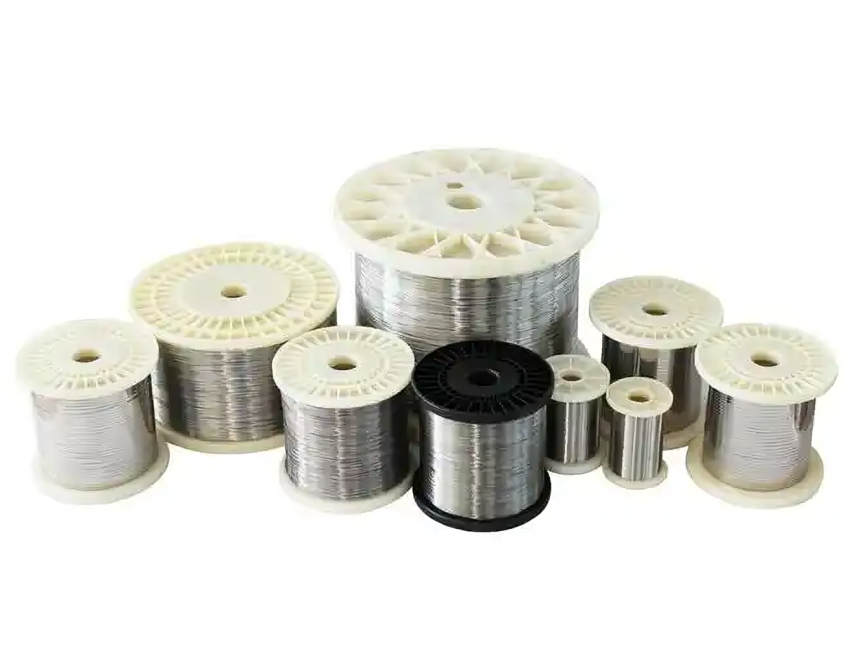
Cr20Ni80 Electrical Resistance Alloy
Cr20Ni80, also known as Nickel-Chrome 80/20 or Nichrome 80/20, is a common electrical resistance alloy composed of 20% Chromium (Cr) and 80% Nickel (Ni). It is widely used in electrical heating and resistance applications due to its high-performance characteristics.

Standard Dimensions of Cr20Ni80 Electrical Resistance Alloy in Various Forms
| Form | Diameter/Thickness Range | Width Range | Length Range |
|---|---|---|---|
| Cr20Ni80 Wire | 0.05 mm – 8.00 mm | – | Provided in coils/spools |
| Cr20Ni80 Strip | 0.05 mm – 3.00 mm (thickness) | 5.00 mm – 200.00 mm | Custom lengths available |
| Cr20Ni80 Ribbon | 0.02 mm – 0.80 mm (thickness) | 0.50 mm – 30.00 mm | Provided in coils |
| Cr20Ni80 Rod | 2.00 mm – 12.00 mm | – | 1000 mm – 3000 mm |
| Cr20Ni80 Sheet/Plate | 0.10 mm – 5.00 mm (thickness) | 300.00 mm – 1000.00 mm | Custom lengths available |
| Cr20Ni80 Tube | 5.00 mm – 50.00 mm (OD) | – | 500 mm – 6000 mm |
Chemical composition of Cr20Ni80 Electrical Resistance Alloy
| Element | Composition (%) |
|---|---|
| Nickel (Ni) | 76.0 – 78.0 |
| Chromium (Cr) | 19.0 – 21.0 |
| Iron (Fe) | ≤ 1.0 |
| Silicon (Si) | ≤ 1.0 |
| Manganese (Mn) | ≤ 0.5 |
| Carbon (C) | ≤ 0.08 |
Corresponding and Similar Grades to Cr20Ni80 Electrical Resistance Alloy
| Standard | Grade/Designation |
|---|---|
| UNS | N06003 |
| DIN | 2.4869 |
| JIS | NCHW-1 |
| ASTM | B366 |
| GB | GH20 |
| VDM Metals | Cronifer II |
| Kanthal | Nikrothal 80 |
| Isabellenhütte | IN80/20 |

Our company maintains strong cooperative relationships with many well-known domestic enterprises, such as Taigang (TISCO) and JISCO. We have advanced technology and production equipment, and our metal products have passed international quality standard certifications.(SGS ISO 9001)

We offer a wide variety of alloy products to meet your diverse needs. You can choose from different shapes and grades of alloys. With a large inventory of metal products, we can quickly fulfill your order requirements.

Huaxiao Alloy is a trusted alloy metel supplier. Our team provides full support from pre-sales to after-sales services. Our 24/7 customer service ensures that your needs are always taken care of. We are here to solve any issues related to your alloy material requirements at any time!
Physical Properties of Cr20Ni80 Electrical Resistance Alloy
| Property | Value |
|---|---|
| Density | 8.4 g/cm³ |
| Electrical Resistivity | 1.09 µΩ·m at 20°C |
| Thermal Conductivity | 11.3 W/m·K at 20°C |
| Coefficient of Expansion | 16.2 × 10^-6 /°C (20-1000°C) |
| Melting Point | 1400°C |
| Maximum Operating Temperature | 1200°C |
Mechanical Properties of Cr20Ni80 Electrical Resistance Alloy
| Property | Value |
|---|---|
| Tensile Strength | 600 – 800 MPa |
| Yield Strength | ~ 350 MPa |
| Elongation | 15 – 30% |
| Hardness | 180 – 220 HV |
| Modulus of Elasticity | 200 GPa |
Applications in Various Industries
- Heating Elements: Widely used for electrical heating elements in both household (e.g., toasters, ovens) and industrial heating (e.g., furnaces, kilns). Its stable resistivity and resistance to oxidation make it ideal for consistent performance.
- Electrical Resistances: The alloy is commonly used to manufacture precision resistors. Its ability to retain consistent electrical resistivity under changing temperatures ensures precision in electronic circuits.
- Laboratory Equipment: Cr20Ni80 is also used in laboratory heaters and temperature control equipment due to its resistance to corrosion and ability to withstand thermal cycling.
Comparison to Other Alloys
- Versus FeCrAl Alloys: Compared to iron-chromium-aluminum (FeCrAl) alloys, Cr20Ni80 exhibits better ductility, weldability, and corrosion resistance but has a lower maximum operating temperature.
- Versus Pure Nickel Alloys: Cr20Ni80 has better electrical resistance than pure nickel alloys, making it a more energy-efficient choice for resistance heating.
Thermal Expansion and Creep Resistance
- Coefficient of Thermal Expansion: The alloy has a coefficient of thermal expansion of approximately 16.2 × 10^-6 /°C, which means it expands moderately with temperature. This must be accounted for in high-temperature designs to prevent warping or failure of elements.
- Creep Resistance: Cr20Ni80 is resistant to creep deformation at elevated temperatures, making it reliable for use in continuous heating applications, where the material is exposed to constant stress and high temperatures for long periods.
Limitations and Considerations
- High Cost of Nickel: Due to its high nickel content, Cr20Ni80 can be more expensive than other resistance alloys. This cost factor may need to be considered for applications that do not require the superior properties provided by nickel.
- Maximum Operating Temperature: While Cr20Ni80 can operate at temperatures up to 1200°C, higher-temperature applications might require FeCrAl alloys, which can withstand even higher temperatures.



